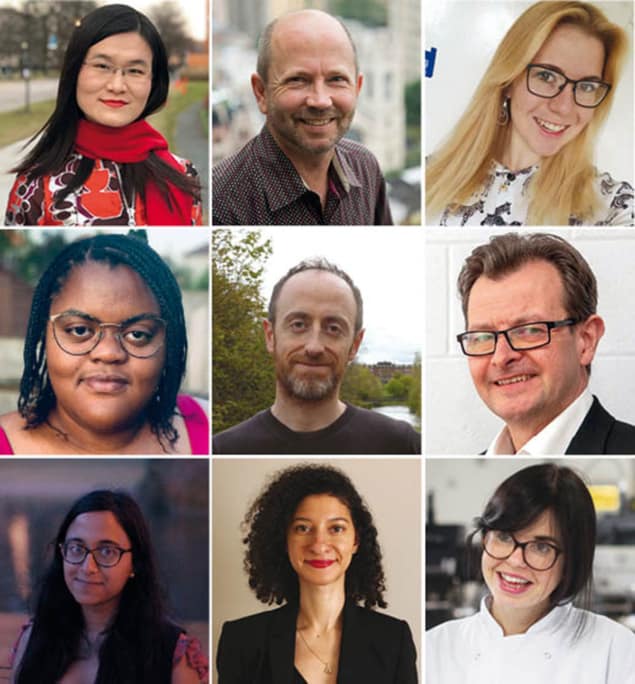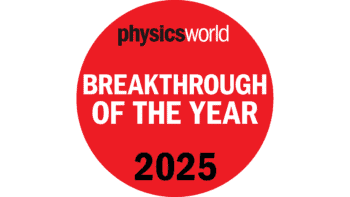
Here at Physics World, we’re always striving to cover the full breadth of physics – from astrophysics and cosmology to particle physics and everything in-between. We also do our best to report on the subject wherever it’s going on in the world as you’ll have seen from our recent coverage of China, Japan and the US. But Physics World certainly needs to do more to ensure we’re showcasing everyone in physics – not just those who have followed conventional paths into the subject but also those who have faced barriers of gender, class or race.
To represent the full breadth and diversity of today’s physics community, Physics World is this month excited to introduce a pool of new contributing columnists. They are all active and thought-provoking physicists who will bring a new perspective to a range of professional matters such as education, careers, publishing, funding and diversity. They will join Robert P Crease (top, middle in the image above) and James McKenzie (middle, right) in our stable of regular opinion-writers for Physics World.
The first four columns by our contributing columists have appeared in the November issue of Physics World and will be published online on the Physics World website over the course of this week. These first articles focus on the challenges facing Black physicists, the importance of teachers, the need to support research in physics education and why it is important to seek out opportunities even during a pandemic.
For the record, here is the full list of the Physics World contributing columnists and make sure you keep an eye out for future columns in the magazine and online.
Yangyang Cheng (top, left) is a postdoctoral research associate at Cornell University, US, and a member of the CMS experiment at the CERN particle-physics lab. Cheng received her PhD in physics from the University of Chicago in 2015. Cheng writes the monthly Science and China column for SupChina, a New York-based digital publication covering contemporary China, and has written for the New York Times, the Guardian, Foreign Policy, MIT Technology Review, ChinaFile and Bulletin of the Atomic Scientists as well as appeared on the BBC, NPR and ABC Australia.
Caitlin Duffy (top, right) is a condensed-matter physics PhD student at the High Field Magnetic Laboratory in Nijmegen, Netherlands. When out of the lab, she happily spends her time weightlifting, running, practicing piano and chatting about all things whisky and wine.
Karel Green (middle, left) is an astrophysics PhD student at the University of Nottingham, UK. She founded and currently runs a social enterprise called POC2, which works to remove the systematic biases that prevents people from marginalized backgrounds progressing in academia and also works to decolonize the current STEM curriculums.
Nicolas Labrosse (middle, middle) is a senior lecturer at the University of Glasgow, UK. He co-chairs the university’s Astronomy and Physics Education group and leads the Institute of Physics’ Higher Education Group committee.
Pruthvi Mehta (bottom, left) is a particle-physics PhD student at the University of Liverpool, UK. Her research is centred on the Tokai-to-Kamioka, Super-Kamiokande, and Hyper-Kamiokande neutrino experiments based in Japan. She is also a contributor for POC2, a social enterprise which focuses on improving BAME diversity in STEM fields.
Chanda Prescod-Weinstein (bottom, middle) is an assistant professor of physics and astronomy, and core faculty in women’s and gender studies at the University of New Hampshire, US. A particle cosmologist by training, she is a dark-matter theorist and also conducts research in Black feminist science, technology and society studies. Prescod-Weinstein is one of under 100 Black American women to earn a PhD from a department of physics and is the recipient of the 2021 American Physical Society Edward A Bouchet Award. She is a monthly columnist for New Scientist and her forthcoming book The Disordered Cosmos: a Journey into Dark Matter, Spacetime, and Dreams Deferred will be released on 9 March 2021.
Jess Wade (bottom, right) is an Imperial College Research Fellow at Imperial College London, UK. She is the author of the Physics World Discovery ebook Printed Electronics. Wade is involved with several science communication and outreach initiatives and is committed to improving diversity in science, both online and offline. Since 2018 she has written hundreds of Wikipedia biographies of women and people of colour in science.



